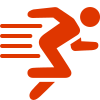Eggs for Running – The Ultimate Powerhouse for Your Workout
As a runner, you may have asked yourself if it’s a good idea to eat eggs for running? Eggs are considered a complete protein, and are easily absorbed by our bodies. Today, we’ll discuss everything runners should know about consuming eggs. Let’s get started!
If you want to know whether eating eggs for running is good, the short answer is yes. They have high levels of protein, and various vitamins and benefits. If eggs suit your diet, then eating eggs before running would be beneficial for you
Eggs as Part of the Runner’s Diet
Are eggs good for runners? They certainly are! Eggs contain an impressive array of nutrients and are part of a healthy diet. They are a protein powerhouse, and include essential amino acids, healthy fats, and micronutrients. They help repair broken muscle fibers and promote muscle growth, which makes them the perfect post-run meal.
Starting your day with the protein and fat contained in eggs will help you sustain energy levels and avoid a blood-sugar dip later on. But are eggs good before a run? If you have some time before a race and want to eat a protein-heavy meal, try eating scrambled eggs before running.
Types of Eggs and Their Main Nutritional Benefits
There are different types of eggs, each providing specific nutritional benefits.

- Chicken Eggs – These are the most common type of eggs available on the market and are widely eaten.
- Quail Eggs – These are smaller, lighter, and richer in nutrients than chicken eggs. They are rich in B complex vitamins and contain 1.2 grams protein.
- Duck Eggs – These are similar to chicken eggs, although they have a slightly bigger yolk. They provide more nutrients gram-for-gram than chicken eggs. Many runners have discovered that incorporating eggs into their diet can provide a valuable source of nutrition, making running and duck eggs a winning combination for improved performance.
- Turkey Eggs – Turkey eggs are very similar to duck eggs when it comes to taste and size.
- Goose Eggs – Goose eggs are almost twice the size of chicken eggs, with an enhanced taste and more protein.
- Ostrich Eggs – The largest of the bird eggs, ostrich eggs weigh around 1.3 kilograms.
- Emu Eggs – Also quite large, emu eggs weigh around 1 kilogram.

Pro Tip:
Freshness matters! Fresh eggs have richer yolks and firmer whites. To check freshness, do the float test. Place your egg in a bowl of water. Bad eggs float, fresh eggs sink and lie flat on the bottom, and older eggs stand on one end.
Are Eggs Good For Runners?
Eggs provide valuable nutrition for runners and offer various physical benefits.
High-Quality Protein
The high-quality protein content supports muscle repair and remodeling. It also helps with overall energy production and nitrogen balance.
Muscle Recovery
Amino acids, especially leucine, help with muscle protein synthesis, which is involved in repairing and growing your tissues after a run. So, if you’re still thinking whether you should eat eggs before half marathon, you certainly should!
Satiety
Eggs can help control appetite, benefiting runners who are trying to manage weight, while still providing energy. Many runners love consuming eggs before half marathon as a way to fuel their bodies with essential nutrients and energy.
Rich in Nutrients
Eggs have many essential nutrients, including B vitamins like B12, riboflavin, and folate. They also have a lot of minerals, like iron, phosphorus, and selenium, which are important for energy production.
Disadvantages of Eating Eggs for Runners
When thinking about what you should eat before running in the morning, it is important to consider the pros and cons of eating eggs. Now that we’ve covered the advantages, let’s discuss the disadvantages.
Digestive Sensitivity
Some people may experience digestive discomfort or allergies when eating eggs.
High-Fat Preparation
When you prepare eggs with oil or fry them in butter, it can slow down your digestion. This may not be ideal if you consume eggs right before a run.
Individual Tolerance
Individual tolerance to eggs can vary across runners. What works for one runner may not work for another, so paying attention to how your body reacts to eggs is essential.
When Is It Best to Eat Eggs?
One question to consider is are eggs good to eat before a run or after. Let’s go!
Eating Eggs Before Running
Consuming eggs before running is good because they can increase muscle protein synthesis, which may last for several hours. Consuming 20-30g of protein is optimal, and boiled eggs are a good source.
Eating boiled eggs before running is great because they are easy to digest and rich in protein. No matter whether your run is a 5k or a full marathon, eggs are a great pre-race meal.
How Long Should I Wait to Run After Eating Eggs?
Eggs take a while to digest, so eating them several hours before your run is ideal. Especially if you prepare them in butter or oil, you should wait 3-4 hours before your run.
Subscribe to Our Running Newsletter!
Get free running tips from renowned professional athletes and discounts from top-notch brands.
Eating Eggs After Running
While eggs are a great post-workout meal, consuming them right after running might not be the best idea. It’s better to wait 1-2 hours, as intense exercises such as running diverts blood away from the digestive system.
The protein in eggs repairs muscle tissues damaged during running, reduces post-running soreness, and promotes faster recovery.
Do Eggs Help In Running?
Eggs help runners in many ways. They give runners high-quality protein, which is needed for muscle protein synthesis. They are rich in essential vitamins and contain all the essential amino acids. Eggs are also satiating and can help runners control their appetite, which can be good for weight loss or maintaining weight.
The Best Ways for Runners to Use Eggs
There are many ways you can cook eggs, and that’s one of the main reasons everybody loves them! Let’s discuss some of them.
1. Boiled Eggs

This is arguably the easiest way to cook eggs. Just drop an egg or two in boiled water and wait a few minutes.
2. Baked Eggs

Baking eggs involves adding a bit of oil or butter to a tray, oven sheet, or cupcake dish. Baked eggs are also known as shirred eggs. You can add extra ingredients if you prefer to do so.
3. Omelets

Omelets are a very popular dish made by frying beaten eggs with additional ingredients, such as cheese, mushrooms, or bacon.
4. Frittata

A frittata is an Italian dish similar to an omelet. To make it, add the eggs and the ingredients, then mix them in a skillet on low heat.
5. Poached Eggs

Poaching eggs involves cracking each egg open, gently pouring it into simmering water, and then waiting a few minutes. Since they don’t need any extra fat for cooking, their nutritional value is the same as boiled eggs.
6. Scrambled Eggs

This dish involves beating eggs into a consistent liquid before frying the mixture in a pan while continuously folding them. They can be mixed with water, milk, butter, or other ingredients.

Pro Tip:
For extra creamy scrambled eggs, cook them over low to medium-low heat. Stir frequently and remove them from the heat just before they’re fully ready, then let them continue to cook in the pan.
Frequently Asked Questions About Eggs for Running
Can I Eat Eggs Before a Half-Marathon?
Yes, you can! As long as you’re used to eating eggs, and prepare them several hours before your half-marathon, eggs make a great meal.
Is It OK To Eat Eggs Before a Workout?
Eggs are a great pre-workout meal. They promote muscle repair and provide you with energy.
Summing It Up!
Eggs are a great source of many necessary vitamins and amino acids. In addition they are fun to prepare because there are so many different options. Do you eat eggs as a runner? What is your favorite dish? Tell us in the comments!
Also Read:
- Running for Seniors
- Best Belly Band for Pregnancy Running
- Running After a New Tattoo
- Why Are Running Shorts So Short
- Protein Shake After Running
- Can I Take Pre Workout Before a Run
- Is Rucking Better Than Running
- Best Running Shoes For Haglund’s Deformity
- Are Vans Good for Running
References:
- Rylee T. Ahnen, Joanne L. Slavin, “Eggs as Part of a Healthy Eating Pattern,” https://experts.umn.edu/
- Ana M López Sobaler, Aránzazu Aparicio Vizuete, Rosa M Ortega, “Role of the egg in the diet of athletes and physically active people,” https://pubmed.ncbi.nlm.nih.gov/
- Madeleine Myers and Carrie Helen Stevenson Ruxton, “Eggs: Healthy or Risky? A Review of Evidence from High-Quality Studies on Hen’s Eggs”, https://www.ncbi.nlm.nih.gov/
- Sophie Réhault-Godbert, Nicolas Guyot, and Yves Nys, “The Golden Egg: Nutritional Value, Bioactivities, and Emerging Benefits for Human Health,” https://www.ncbi.nlm.nih.gov/
- “Health Concerns With Eggs”, https://www.pcrm.org/
- “EAT YOUR EGGS AFTER: A RECOVERY FOOD FOR ATHLETES”, https://www.ee-staging.eggnutritioncenter.org/
If you have any questions or suggestions, you can contact us via email – [email protected]






